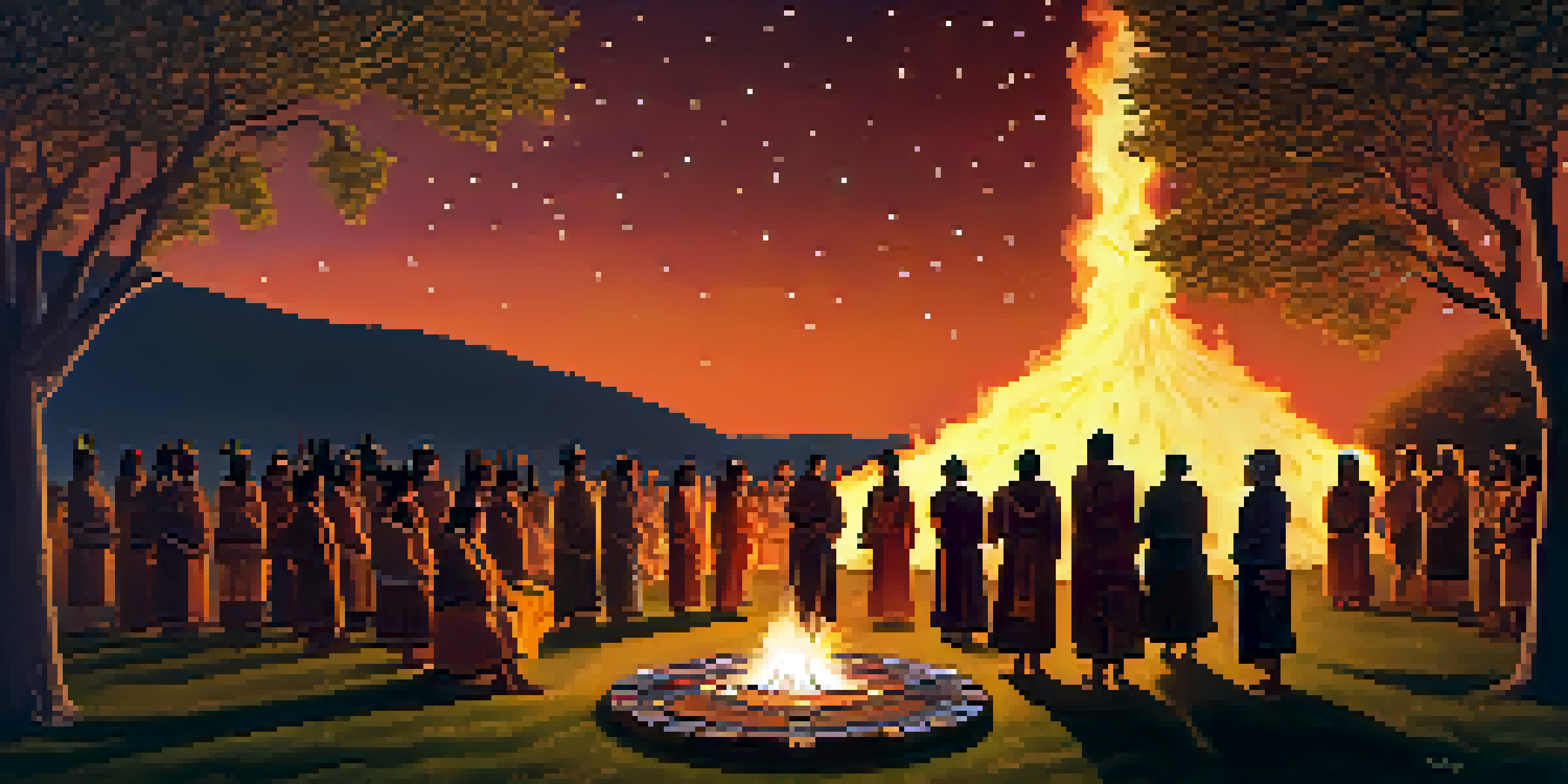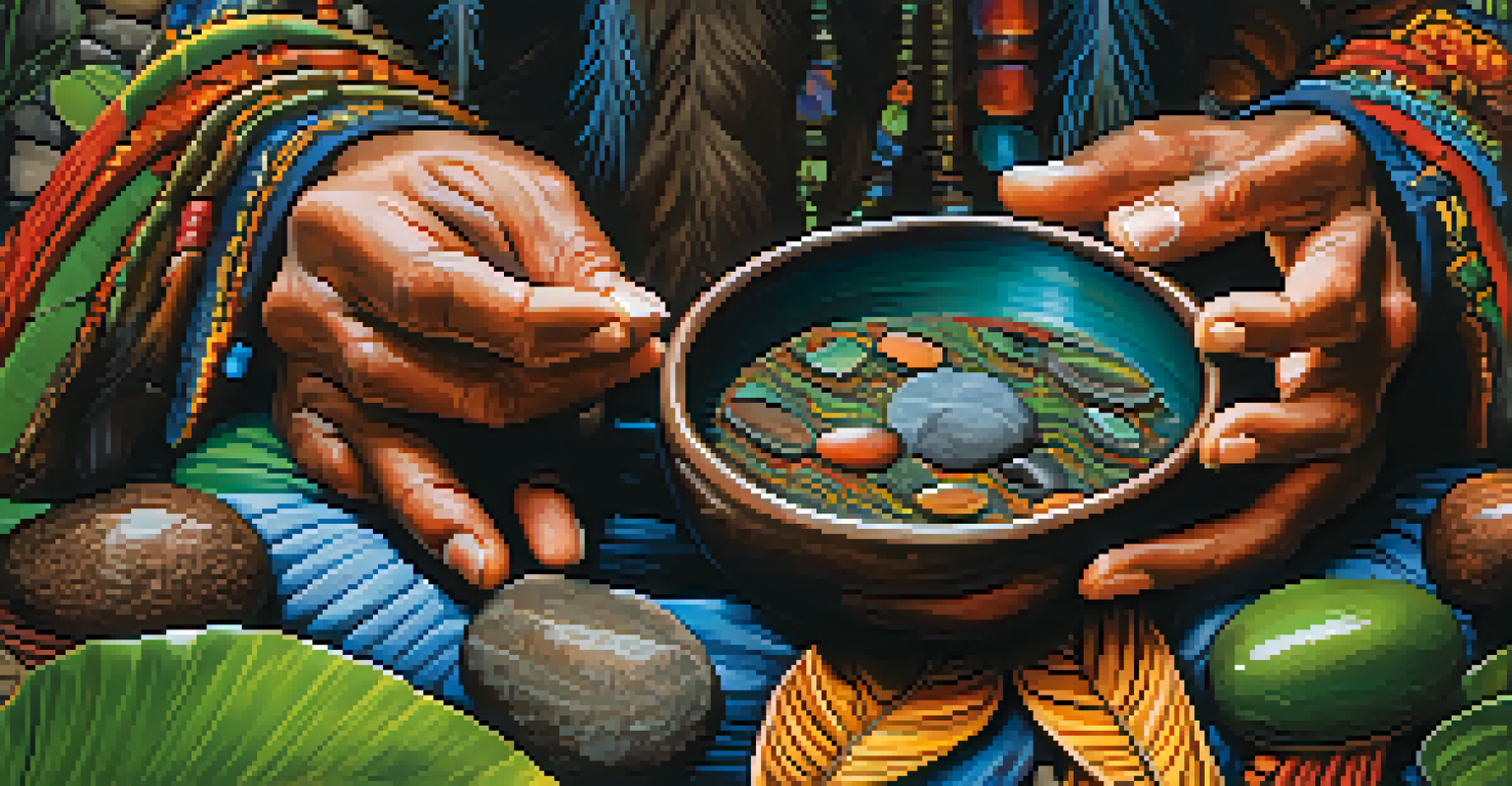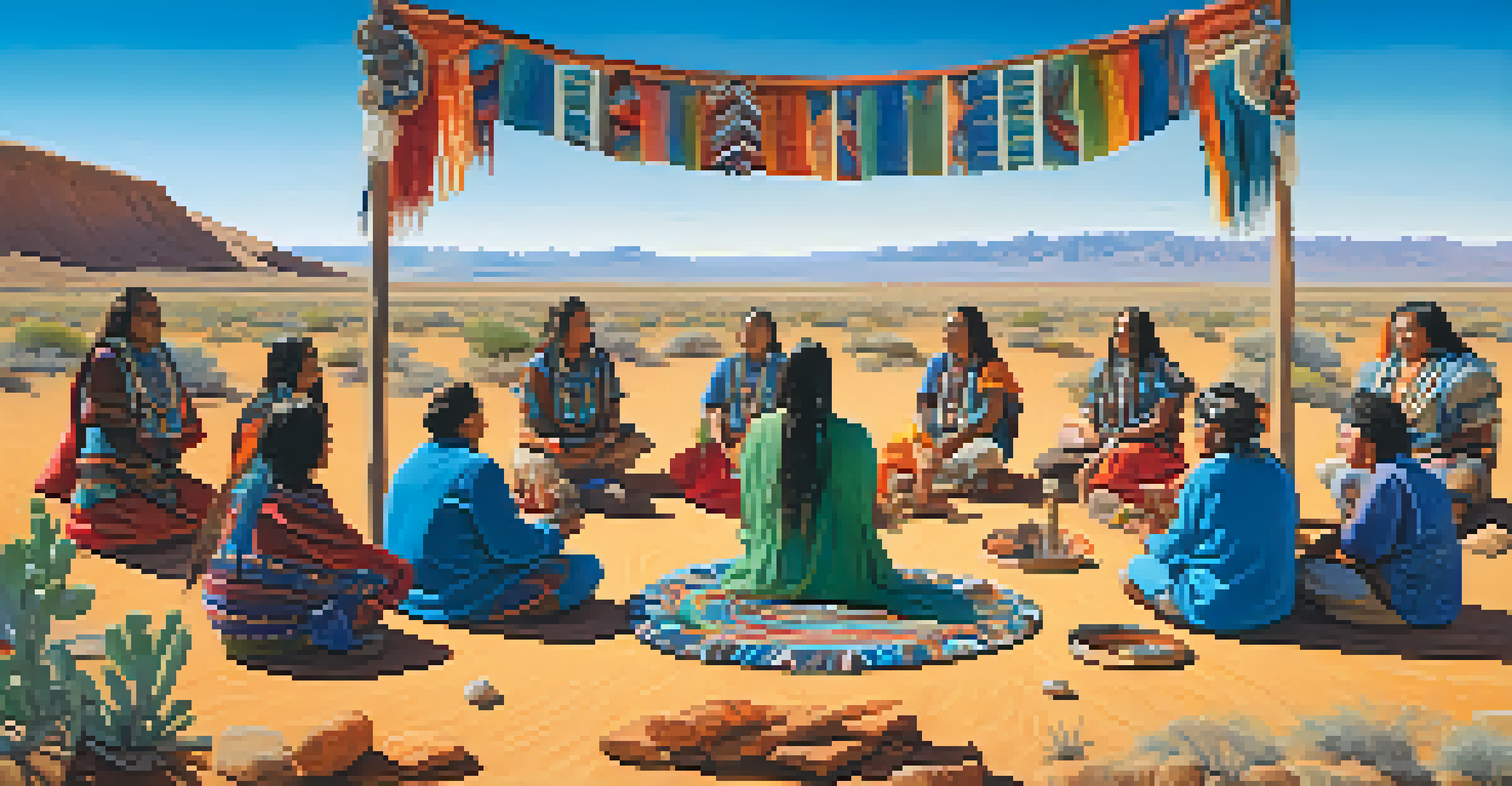Psychedelics and Indigenous Wisdom: A Cultural Connection

Understanding Psychedelics and Their Cultural Significance
Psychedelics, substances that alter perception and consciousness, have been used for centuries. Indigenous cultures around the world often incorporate these substances into their spiritual practices, viewing them as tools for healing and connection. For many, these experiences transcend mere recreation; they are deeply rooted in cultural heritage and rituals.
Psychedelics can aid in the healing of the spirit and the mind, but they require a respectful approach to the cultures that have used them for centuries.
These sacred plants and fungi, such as peyote and ayahuasca, hold significant meanings and are intertwined with the identity of various indigenous peoples. They are not just substances; they are a bridge to understanding the universe and our place within it. The communal aspect of these experiences often fosters a sense of belonging and interconnectedness with nature and each other.
As modern society becomes more curious about psychedelics, it’s crucial to approach these practices with respect. Understanding their cultural significance can help prevent the commodification of these sacred elements, ensuring that indigenous voices are honored in discussions about psychedelics.
Indigenous Practices: Rituals and Spirituality
Indigenous rituals often involve psychedelics as a means of spiritual exploration. For example, the Native American Church incorporates peyote into its ceremonies, believing it opens pathways to divine communication. These practices are not random; they are carefully structured to guide participants through profound experiences.

During these rituals, participants may engage in singing, drumming, and storytelling, creating a rich tapestry of cultural expression. This communal experience enhances the effects of the psychedelics, fostering a deeper connection to the spiritual realm. It’s a reminder that these substances are part of a broader cultural context, emphasizing the importance of tradition.
Cultural Context of Psychedelics
Psychedelics have profound cultural significance, serving as tools for healing and connection within indigenous practices.
Furthermore, the integration of these experiences into daily life is crucial. After a psychedelic journey, individuals often share insights with their communities, reinforcing bonds and imparting wisdom. This cyclical nature of sharing and learning is a cornerstone of indigenous spirituality.
Psychedelics and Healing: A Holistic Approach
Many indigenous cultures view psychedelics as powerful tools for healing both individuals and communities. This holistic approach often combines physical, emotional, and spiritual healing, addressing the root causes of distress rather than just symptoms. For instance, ayahuasca ceremonies are known for their purging effects, both physically and emotionally.
We must honor the indigenous roots of psychedelics and recognize that these practices are not ours to exploit but to learn from.
In these settings, shamans guide participants through their journeys, helping them confront traumas and navigate complex emotions. This guidance is crucial, as the psychedelic experience can be overwhelming without a knowledgeable facilitator. The shaman’s role is not just to administer the substance but to provide a safe space for healing.
Moreover, the communal aspect of healing is significant. Participants often find solace in shared experiences, creating a supportive environment that fosters recovery. This collective healing process emphasizes the interconnectedness of all beings, highlighting the importance of community in indigenous practices.
The Modern Psychedelic Renaissance
In recent years, there has been a resurgence of interest in psychedelics, often referred to as the 'psychedelic renaissance.' This renewed fascination is largely driven by scientific research highlighting the therapeutic benefits of psychedelics for conditions like PTSD and depression. However, this modern exploration must tread carefully, keeping indigenous wisdom in mind.
As researchers and advocates delve into the potential of psychedelics, it’s essential to acknowledge the historical context and cultural significance of these substances. Many indigenous communities are wary of modern practices that may exploit these sacred elements without proper respect. Engaging with these communities can provide valuable insights and foster collaboration.
Holistic Healing Approaches
Indigenous cultures utilize psychedelics for holistic healing, addressing emotional, physical, and spiritual needs through guided experiences.
Ultimately, the psychedelic renaissance presents an opportunity to bridge ancient wisdom with contemporary science. By respecting indigenous practices and integrating their knowledge, we can create a more holistic understanding of psychedelics and their potential benefits.
Ethical Considerations: Respecting Indigenous Knowledge
As interest in psychedelics grows, ethical considerations come to the forefront. It's crucial to approach indigenous knowledge with humility and respect, acknowledging that these practices are not merely resources to be exploited. Many indigenous communities have been protecting their traditions for generations, often facing oppression and marginalization.
This cultural appropriation can lead to significant harm, diluting the spiritual essence of these practices. It’s vital for those interested in psychedelics to engage authentically with indigenous communities, seeking permission and guidance rather than taking without understanding. This respectful engagement can foster mutual benefit and preserve cultural heritage.
Furthermore, the sharing of indigenous practices should be done transparently and fairly. Collaborative efforts can enable indigenous voices to lead discussions about psychedelics, ensuring their perspectives are at the forefront. This approach not only honors their wisdom but also enriches the broader conversation about psychedelics.
Personal Stories: Transformative Experiences
Personal narratives often illustrate the profound impact of psychedelics within indigenous contexts. Many individuals recount transformative experiences that not only altered their perspectives but also deepened their connections to their heritage. These stories can serve as powerful testimonials to the healing potential of psychedelics when used respectfully.
For example, someone may share how a peyote ceremony helped them confront a deep-seated trauma, leading to a renewed sense of purpose. These anecdotes highlight the importance of guided experiences that honor tradition and foster personal growth. It's a reminder that, while psychedelics can be powerful, the context in which they are used plays a significant role in their effects.
Ethical Engagement with Communities
Respectful engagement with indigenous communities is essential to honor their wisdom and prevent cultural appropriation in modern psychedelic practices.
Such stories also emphasize the role of community in these transformative journeys. Participants often express gratitude for the support of their peers and facilitators, reinforcing the idea that healing is a collective endeavor. Through sharing these experiences, we can appreciate the rich tapestry of human experience surrounding psychedelics.
The Future of Psychedelics and Indigenous Wisdom
Looking ahead, the relationship between psychedelics and indigenous wisdom holds great promise. As research continues to unveil the therapeutic benefits of psychedelics, there’s potential for collaboration between scientists and indigenous healers. This partnership could lead to innovative healing practices that honor tradition while embracing modern science.
However, it is essential to ensure that indigenous communities benefit from this resurgence. This could involve fair compensation for their knowledge and practices, as well as opportunities for them to participate in research. By doing so, we can create a more equitable landscape that respects and uplifts indigenous voices.

Ultimately, the future of psychedelics should be rooted in respect, understanding, and collaboration. By honoring the cultural connections and wisdom of indigenous peoples, we can navigate the complexities of the psychedelic renaissance with sensitivity and integrity.